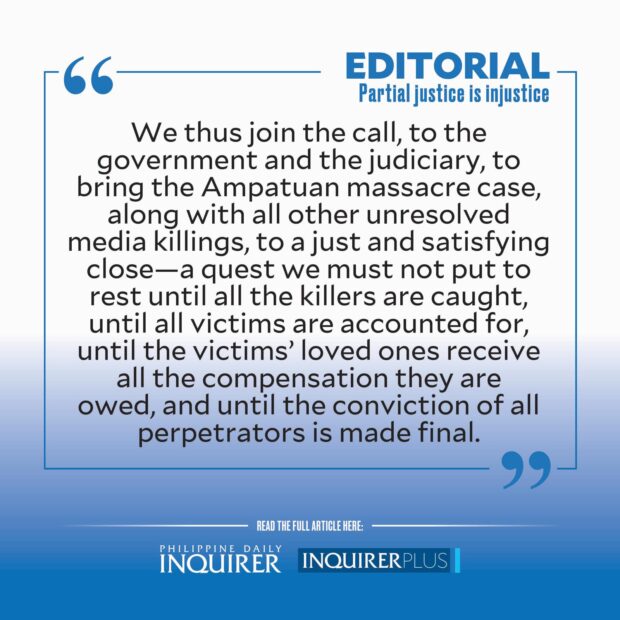Partial justice is injustice

Trite but true is the adage that justice delayed is justice denied. But it must be said as well that justice, when finally served, must be served in its entirety, not in parts or chapters, like a half-written novel, but whole, which means doing right by all who were wronged, and leaving no wrongdoer unpunished.
Anything less is not true justice, for “partial justice” flies in the face of the righteous dispensation of law. A partial justice, therefore, is an injustice in itself.
That is the unfortunate story of the 2009 Maguindanao massacre, also known as the Ampatuan massacre, a belated renaming that rightly casts the spotlight on the political clan behind the crime rather than the poor Mindanao province where it happened, a name and a place still stained in tragedy a decade and a half later.
On Nov. 23, 2009, 58 people, 32 of them journalists, were executed in cold blood while traveling in convoy to submit the gubernatorial candidacy documents on behalf of then Buluan Vice Mayor Esmael “Toto” Mangudadatu, who was challenging the powerful Ampatuan dynasty.
The group of media practitioners, lawyers, aides, and even unsuspecting motorists was ambushed and shot dead en route to Shariff Aguak town. Mangudadatu, who would go on to become Maguindanao governor and later congressman, lost his wife, two sisters, and a cousin, who had joined the convoy in the mistaken belief that women would be spared from attack.
Their bodies were discovered in a town named after the Ampatuan family, some buried in hastily dug mass graves using a backhoe which then stood as a chilling monument to the single deadliest attack on media workers in history.
Fourteen years later, the victims’ families, friends, and colleagues are still clamoring for full justice, as too many offenders have evaded and continue to evade the law.
The Ampatuan patriarch, former Maguindanao governor Andal Ampatuan Sr., the alleged mastermind, had been put behind bars but didn’t live long enough to be found guilty of the crime, as the charges against him were dropped when he died of a heart attack in 2015 while on trial.
It took four more years after his demise for some of his heirs and conspirators to receive their comeuppance, or at least a measure of it. In December 2019, a Quezon City court convicted his sons Andal Ampatuan Jr., former mayor of Datu Unsay town, Zaldy Ampatuan, former Autonomous Region in Muslim Mindanao governor, and Anwar Ampatuan Sr., former Shariff Aguak mayor, of 57 counts of murder and sentenced them to a maximum of 40 years in prison with no parole, along with 25 others, including several members of the clan.
Another 15 people were sentenced to between six and 10 years in prison as accessories to the crime. But 55 were acquitted, including another Ampatuan son, Sajid Islam, incumbent vice mayor of Shariff Saydona Mustapha town.
“In the years since, several key prosecution witnesses have been murdered, some of the accused have died, and 83 of more than 200 suspects still remain at large,” according to the International Federation of Journalists.
In November 2020, the Department of Justice indicted a second set of eight respondents but cleared a larger group of 40. In June 2021, the Court of Appeals reversed the acquittal of a police officer and sentenced him also to a maximum of 10 years in prison.
Then there is the unresolved case of the 58th victim, journalist Reynaldo Momay, whose body has not been found, and for whom the wheels of justice have yet to turn.
The National Union of Journalists of the Philippines said the 2019 decision was far from complete “until the convictions are final and victims’ families receive compensation for the loss of their loved ones.”
On Thursday, the 14th anniversary of the massacre, the Sandiganbayan sentenced Andal Jr. to up to 210 years in prison on 21 counts of graft for failing to deliver over P44 million worth of fuel to the provincial government in 2008.
It’s a welcome consolation, as the appeal of the 2019 conviction in the multiple murder case languishes in the courts, delaying payouts to the victims’ kin, while around 80 of the indicted persons remain in hiding. During last week’s commemoration rites, Mangudadatu lamented: “Some of these suspects are just roaming in the vicinity of Maguindanao.”
Such is the reality of justice too long denied.
We thus join the call, to the government and the judiciary, to bring the Ampatuan massacre case, along with all other unresolved media killings, to a just and satisfying close—a quest we must not put to rest until all the killers are caught, until all victims are accounted for, until the victims’ loved ones receive all the compensation they are owed, and until the conviction of all perpetrators is made final.
Otherwise, the Philippines will never cast off the notoriety of being one of the world’s most murderous places for the press, where the guilty run free and justice lies hidden behind a cloud of impunity.















